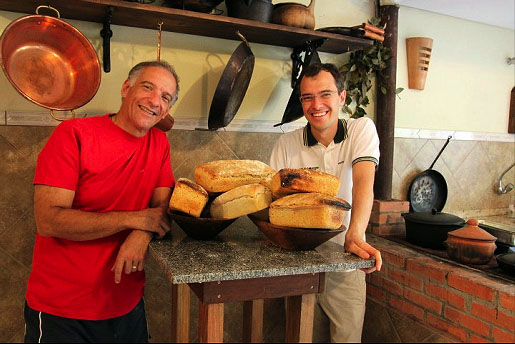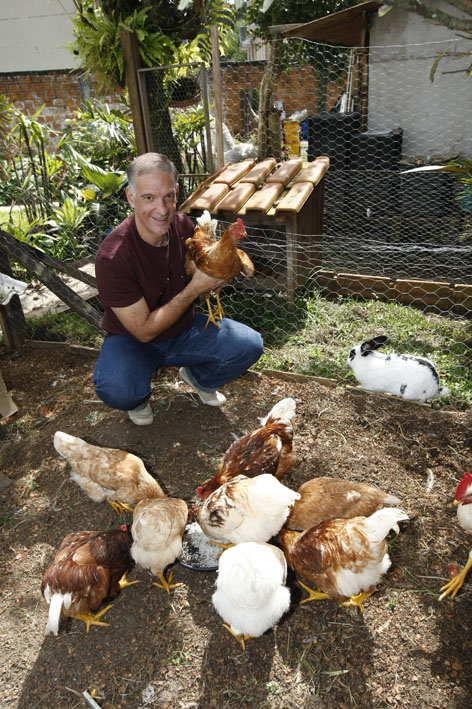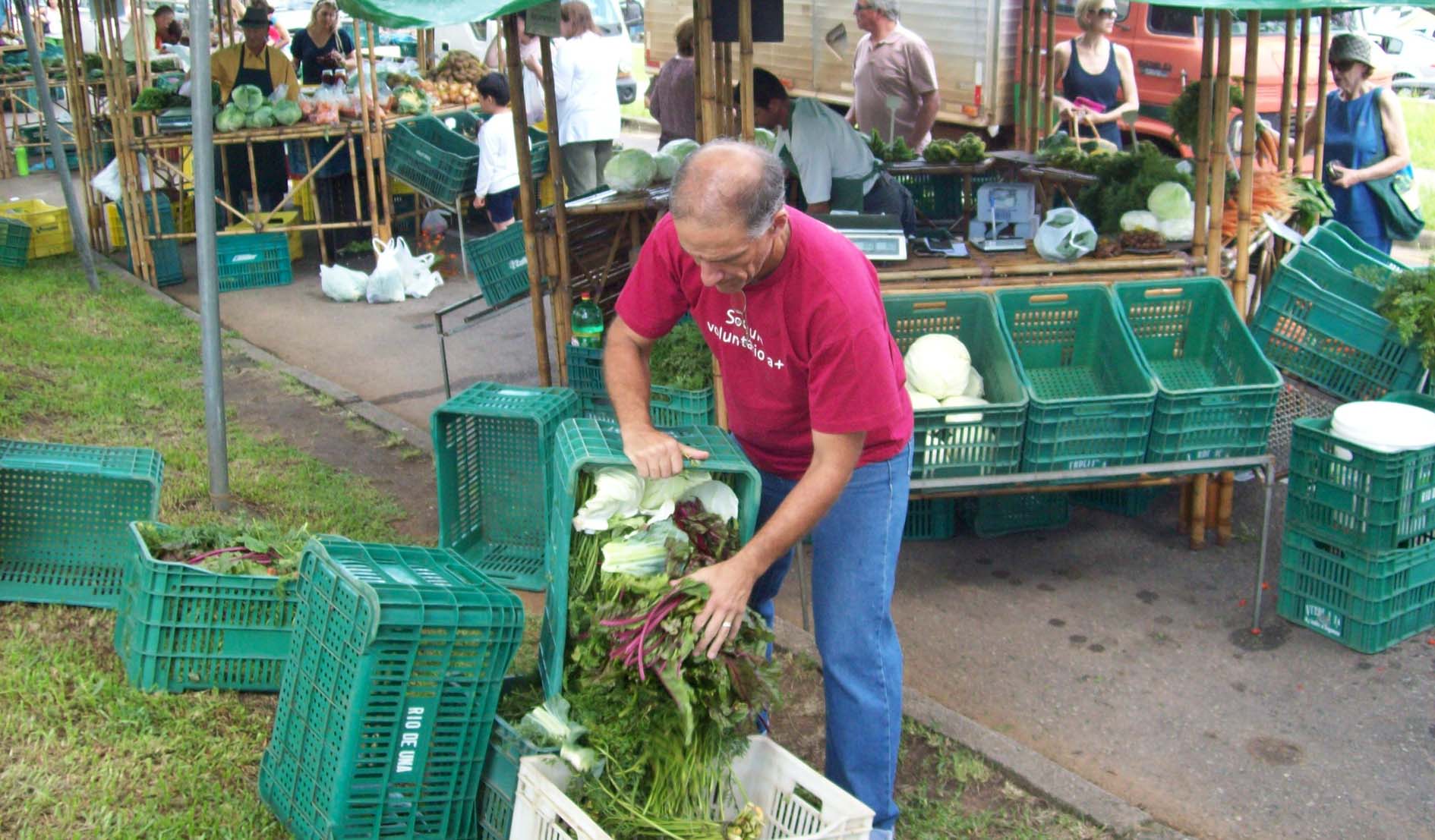
Photo: Claudio and Rene on the weekly Friday bread bake for the community.
Those who know me may find the above title curious, to say the least. Being with the poor is part of my history: my grandfather and grandmother were founders of the Salvation Army here in Brazil, and their ministry is a central reference for my family. Their life was dedicated to the homeless, prostitutes, and in a special way to the orphans, the hurt and the renegades. My teenage passion was consumed by the idea of fighting against poverty, hunger and injustice. Since I got married, 25 years ago, I have been involved in serving in slums, serving poor students, needy populations, beggars, peripheral neighbourhoods, the unemployed and other moneyless people. I have helped generate income, facilitated the organization of families, made bridges between rich and poor, fed people, and given others the opportunity to discover professions, find a vocation and transform their future. To “empower” people was once a key point in my practice of not creating dependency. After all of this, or even because of all this, today I have given up serving the poor.
Throughout my life I have kept a habit of always asking myself whether what I am doing makes sense, whether my heart is aligned with God’s will, whether I am not missing the point. I follow the three “whys” rule - for every thing I do, I ask ‘Why?’ Whatever the answer might be, again I ask ‘Why?’ I feel I am in the right path when what I am doing has passed the third “why”.
Some time ago I started reflecting on the principle of kenosis, or ‘emptying’, as demonstrated in Jesus’ life. This idea is central to the text of Philippians 2:5-8:
In your relationships with one another, have the same mindset as Christ Jesus:
Who, being in very nature God,did not consider equality with God something to be used to his own advantage;rather, he made himself nothingby taking the very nature of a servant,being made in human likeness.And being found in appearance as a man,he humbled himselfby becoming obedient to death -even death on a cross!
This ‘emptying’ is clearly visible in Jesus’ incarnation in the flesh and in his numerous contacts and conversations with the miserable (the lepers and beggars) and the rich (the publicans, synagogue chiefs and princes). I have reflected on what he saw and how he acted. And all of this started to grow in me and made me think about the text in Matthew 5:3, with Jesus telling the poor to march on with their lives and rejoice for being poor, because theirs was the possibility of having their lives guided by God.
Little by little, in these last few years, along with biblical reflection, I have observed how much several extremely sincere friends come and go, get excited with serving, but soon get busy with their errands and preoccupations. Frequently I also see how others pay for someone else to fulfill God’s service, and they do that during certain periods of time, moved by real sincerity, even if from a distance and without personal involvement.
From another perspective I see how much poverty takes over the life of those who are poor, and how much it reveals their unfulfilled desire to own, to have access to consumption – the destroyer of everything – and I see how their situation is re-inforced by the seduction of the same things that seduce and destroy the rich: the same individualism, the same selfishness, the same tendency to grtification and to want to own things.
Without exception, rich, poor, and remediated have the same conviction that what they need is something that the market, money, the government or some other agency can offer them. That they will be happy with ownership, with a full stomach (some with bread, others with croissants) and with the constant flow of money that solves everything. And among these, there are a few well-intentioned people who extend their hand to “include” others into the lifestyle or the platform they achieved.
The stretched-out hand from top down, that’s what we call service. Along the years I’ve discovered that the very position of serving the poor, from a commitment to “liberate” them, has been filled with a sense of superiority, the kind of superiority translated into giving others what I have, assuming through my actions that what I have is what they need; a translation noticed in the subtle arrogance of the so-called politics of “inclusion”, always trying to put the other inside the box where I live, included in my lifestyle.
All of this led me to give up serving the poor. But I am not taking sides with the wealthy and the comfortable; I do not want to join those whose lives are separated from contact with the poor, with the sick, the hungry, the naked, the ugly and the smelly. What these wealthy and comfortable call security, Jesus calls madness.
I have given up serving the poor for another reason. In the early 1990s I used to go into the streets with a bunch of kids seeking out the homeless. The motto we used at that time was “to meet Jesus in the poorest poor”. Serving, feeding and clothing Jesus was our motivation. But we discovered each time we went out, that in each of these encounters with a camouflaged Jesus, the so-called miserable would be transformed into masters, and we suddenly saw ourselves mirrored in them, using the same excuses and lies to get what we wanted. We discovered that we were them.
Confronted by Jesus and taught by him through the contact with his poverty and misery, many of us discovered what good news meant. Those days many of us were transformed by Jesus’ touch and by the good news that he transmitted as we discovered ourselves as poor. We rediscovered a hard truth: Jesus doesn’t have any good news for those who serve the poor. Jesus didn’t come to bring good news to those who serve the poor, he brought good news to the poor. He has nothing to say to other saviors who compete with him for the position of Messiah. Jesus’ agenda only brings a message for those who recognize themselves as poor, naked, hurt, tired, overburdened, needy and hopeless. As for the rest, his agenda has little or nothing to offer.
The only way to remain with the poor is if we discover that we too are the miserable ones; if we recognize ourselves, even if well disguised, in him who is right before our eyes. When we find our misery in them, when we realize our neediness and our desperate need to be saved, then we meet Jesus’ agenda. God is not manifest in our ability to heal, but in our need to be healed.
Finding out this weakness of ours leaves us in a position of having nothing to offer, serve, donate, but reveals our need to be loved, healed and restored. Here lies the meaning that the power within us is not the power of our capacities and richness, but the power that is present in our personal misery, so well-hidden and disguised in our possessions and stability. As Jean Vanier says, “We are called to discover that God can bring peace, compassion, and love through our wounds.” How much more sense does Isaiah’s text about the Messiah make now: by his wounds we are healed. The remaining messiahs tend to escape Jesus’ example of emptying himself to the point of becoming one of us, of dying with us and thus opening the door of resurrection for us. The power that Jesus used to heal us and keep on healing does not reside in his access to universal power, but in his identification with us in the cross. In opening himself in wounds, in becoming one of us, in living our life.
I have given up serving the poor. I’m going back to encountering the poor and finding myself in them. Again I have discovered the misery that hides in the well structured lives of our false security. And this way I can understand this Jesus who talks to lepers and with rich businessmen, with tax collectors in their parties and with the sick and miserable. In his identification with each and everyone, he saw what perhaps no one else did: the extreme misery and poverty of the human condition, apart from any status or social gown. I came to reencounter my poverty, to see myself in each situation of misery, and to get in touch with my inner pain. From there, I pray for healing, freedom, community and love. I ask for mercy and to be restored. Whoever serves out of the sense of having something to offer, serves from the top. Jesus calls us to incarnate and to see ourselves in the other and to place ourselves under him as powerless dependent. To give up trusting our own capacity and change the direction in order to meet our wounds and pain. From there discover the power in being less and not more. I have given up serving the poor. I have rediscovered my poverty. And with it I can cry out again: “Son of David, have mercy on me.”
FOOD, FAITH & COMMUNITY AT CASA DA VIDEIRAEating is connected with our treatment of the dejected and rejected - the leftovers. Our major concern, as Christians living in the city, is how the relationship with food in the city reveals our neglect of creation. Every day, tons of nutrients arrive, are delivered, cooked in the city, and more than 30% of it is wasted. Everyday we collect organic waste in a 3 kilometre radius from our homes: (gardening clips, grocery stores greens, left overs, wood chips and ground coffee). We collect three to four tons of organic garbage a month - the refuse of roughly 150 households - and compost it all in our 0.08 acre backyard, turning it into beautiful soil. From this we produce around three tons of organic veggies per year and feed 25 chicken, 4 goats, 30 rabbits, giving us protein in the form of meat, eggs and milk. All this provides food for ourselves and our neighbours, shared everyday in a communal meal. Photos: (Top ) The animals are an important part of the community’s “biological refinery” - “The chickens eat like they did in grandma’s time: food scrap, greens, corn, and worms provided by our composting program. Feeding them worms for protein means that we don’t have to feed them soybeans, which is one of Brazil’s most destructive monocrops.” (Bottom) Claudio on the daily activity of collecting greens from producer’s markets.
|
Claudio Oliver is married to Katia and is father of Giovana. He is the pastor of “Casa da Videira (Vine’s House)”, a multi-centric, multi-parish community of faith in Curitiba, Southern Brazil. He has been working with urban poor, young people and communities for the last 25 years and in 2011, Claudio and a bunch of scholars and crazy practitioners, are going to be launching an International Learning Community based on spirituality, organic farming, dialog and mentoring on a small homestead.


